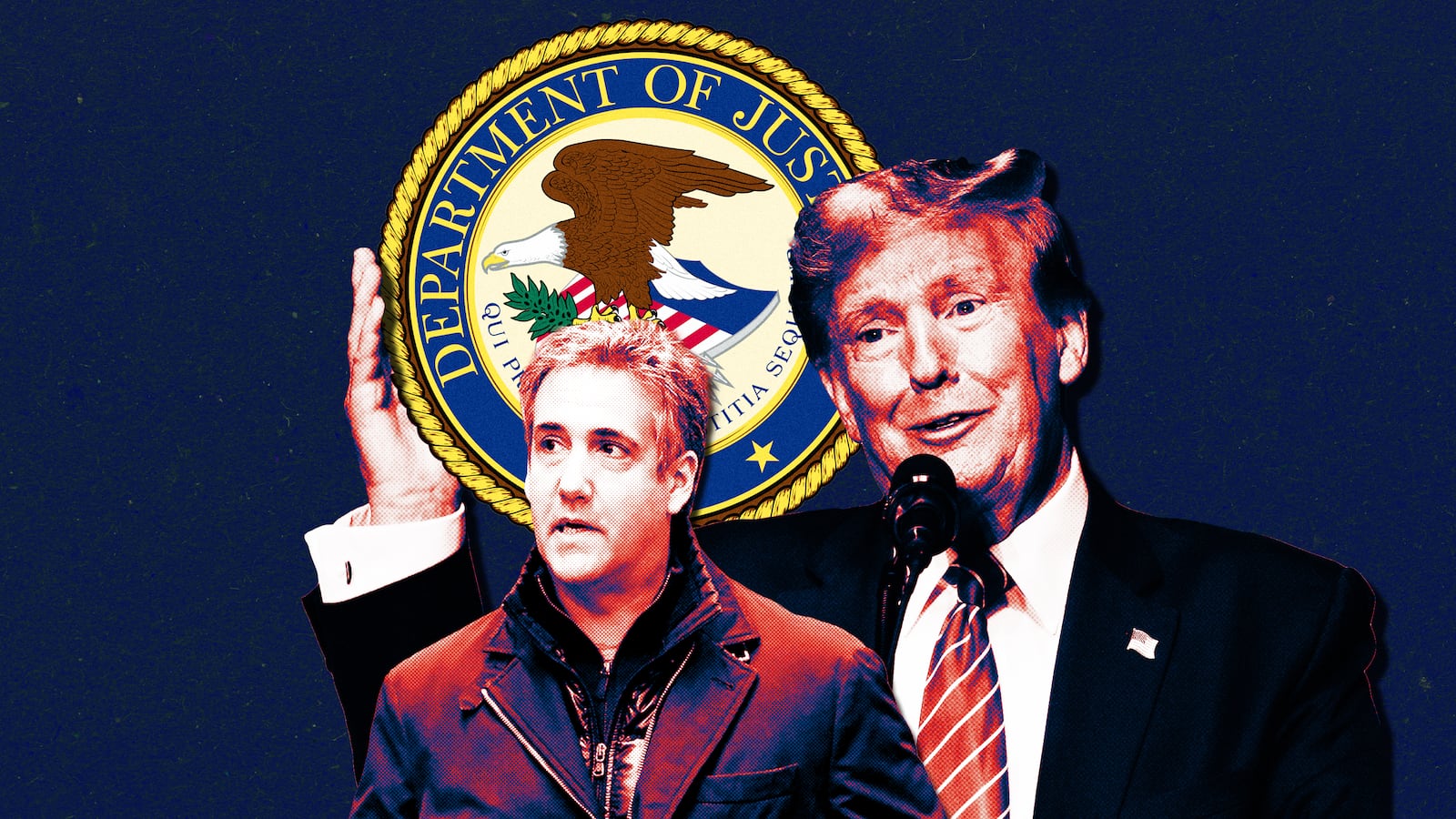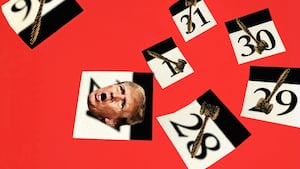Donald Trump’s upcoming Manhattan trial over his Stormy Daniels hush money cover-up was unceremoniously delayed last week when federal prosecutors suddenly dumped 200,000 pages worth of evidence at his request.
But what was unknown—until now—is that the Justice Department had been holding back similar records from public disclosure for years.
The surprise decision by federal prosecutors at the Southern District of New York, which worked on a previous iteration of this investigation before Manhattan District Attorney Alvin Bragg picked up the baton, has thrown the case into chaos just weeks before the trial.
The fog has everyone blaming each other. The DA’s office says Trump played delay games by waiting until the last minute to ask for these records. Trump’s lawyers claim the new files show that the DA held back exculpatory evidence. Meanwhile, legal scholars on the sidelines are asking why the feds unexpectedly presented a trove of new documents to the former president.
But an untold piece of this puzzle is that Michael Cohen, the one-time Trump confidant and fixer whom Bragg is relying on to prove that Trump broke the law, had been asking for many of these same records for more than two years—only to face stiff resistance from the Department of Justice.
Cohen, who feels that the feds unfairly prosecuted him for the hush money deal while never going after his former boss, teamed up with journalist Brian Karem to demand records from the FBI and DOJ.
In December 2021, Karem filed a Freedom of Information Act request for records related to the investigation and prosecution led by the U.S. Attorney’s Office at the Southern District of New York, taking the extra step of getting Cohen’s express permission to obtain information about him. After not hearing back from the feds, Karem sued.
In court filings, the FBI in New York eventually “identified over 450,000 pages of potentially responsive material” and promised to roll out 500 pages a month to Karem starting in August 2022.
But it wasn’t until March 11 this year that the FBI finally started turning over those records to Cohen, which are marked “unclassified.” And when it did, the first batch was a measly 32 pages.

Michael Cohen and his attorney Danya Perry arrive at Trump’s civil fraud trial at New York State Supreme Court in October 2023.
Spencer Platt/GettyBy comparison, SDNY—that very same week—had just sent a whopping 73,193 documents about the same investigation in Trump’s direction. The feds had fast-tracked a request by Trump’s lead defense lawyer, Todd Blanche, who was looking for information that could undercut the Manhattan DA’s case and undermine Cohen’s credibility.
Cohen thinks the DOJ was only spurred into handing him those 32 pages because it had already handed over 6,250 times as many to the former president.
“Trump put in a request for the documents in January, so that orange piece of shit in 45 days gets documents that I’ve been waiting on for years,” Cohen told The Daily Beast. “I’m angry that he’s able to delay this case.”
Indeed, Blanche filed a formal request to SDNY on Jan. 22. One month later, the politically appointed top federal prosecutor at the office, Damian Williams, wrote a letter authorizing the release of those records to the DA, so they could be reviewed and promptly handed over to the Trump legal team.
Karem, a Salon columnist in Washington who hosts his own podcast, expressed his frustration that the DOJ had worked so hard to slow down him and Cohen—but kicked into high gear when the former president came knocking.
“When Donald Trump says there’s a two-tiered justice system, that stupid motherfucker is exactly right! Here’s the problem: He’s on the top tier, and the rest of us aren’t,” he told The Daily Beast on Wednesday.
On Thursday, Trump’s 2024 presidential campaign communications director, Steven Cheung, responded with a swipe at Cohen that referenced the previous day’s news.
“Michael Cohen is a convicted, repeated perjurer and compulsive liar. Nothing he says can be taken as anything other than fiction. Just yesterday a federal judge refused to reduce his supervised release sentence because he continues to lie and cheat the system, including lying on the stand in the NYAG case and his A.I.-generated legal brief. No ethical prosecutor or judge can use Cohen’s testimony in any case,” Cheung said.
The DOJ did not respond to a request for comment.
In court, DOJ lawyers in Washington have spent 24 months filing 18 “status reports” listing a litany of reasons for why the records simply weren’t available to Cohen and Karem yet, citing a “painstaking and time-intensive review” by federal prosecutors at SDNY “who have other litigating and prosecutorial responsibilities.”
They’ve also claimed that the FBI can’t simply turn over records documenting the way agents went about with their investigation, citing a need to seek “consultations” from more than 25 other government agencies “with overlapping equities.”
Now that Karem sees the way SDNY quickly moved to fulfill Trump’s request in just a month and a half, he balked at the excuses he got for years.
“I don’t want to hear that you can’t produce it for me,” he said. “If Congress is going to tell us that they’re for transparency, then make the government a little more transparent.”
By contrast, state court filings reflect that SDNY has turned over 119,000 pages meant for Trump this month alone. A source familiar with the situation told The Daily Beast that total was bumped up to 200,000 pages this week.
The former president’s lawyers are employing that recent development to accuse Bragg of holding back information relevant to the case—what would amount to any dirt the feds picked up when they took the first bite of the apple and chose to not indict Trump. The move plays into Trump’s goal to discredit Cohen.
Bragg’s office has fiercely denied violating information-sharing rules in court, claiming that Trump’s team engaged in underhanded tactics by firing off an eleventh hour request for largely duplicative documents from the feds—timing that assistant district attorney Matthew Colangelo called “a function of defendant’s own delay.”
On March 8, Trump’s attorney Blanche also asked the New York judge overseeing the hush money case, Justice Juan Merchan, to sanction the DA’s office for improperly redacting “SDNY & FBI materials” that could shed light on “details of their handling of requests for benefits and favors by Cohen, [Stormy Daniels, and] any other witness.”
On Monday, Colangelo wrote to the state judge that any complaints about redactions are bogus because Trump actually got unredacted versions of the same materials in a single folder, a fact that “suggests he is more interested in manufacturing and publicizing perceived discovery violations then in using the materials provided to prepare for trial in this matter.”
But while the DA’s prosecutors and Trump’s defense lawyers bicker about the sudden appearance of documents related to the FBI’s hush money investigation, Cohen is fuming. He’s flummoxed that Trump could simply leapfrog his way to victory—beating Cohen in the race to get the man’s own government files.
Cohen called on Attorney General Merrick Garland to investigate what he chalked up to an ongoing grudge by federal prosecutors at the office that went after him so aggressively—but would not pursue a case against Trump while he was in the White House, in large part due to constant resistance from William Barr, then Trump’s AG.
That scandal has received scant attention despite its monumental implications and was detailed by Geoffrey Berman, who led the prestigious SDNY office at the time.
“The Southern District of New York believes themselves to be above everyone and everything. They refer to themselves grossly as the ‘Sovereign’ District of New York. They’re not obligated to. They threaten. They’re coercive. They lie,” Cohen fumed. “Then they get seven-figure jobs with the top law firms.”








